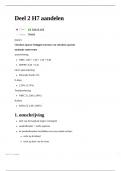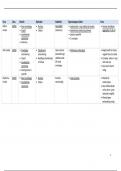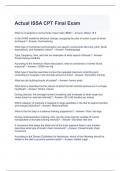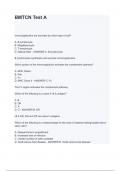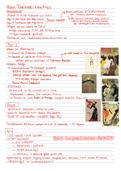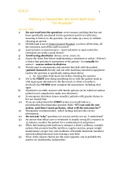Periodic Table Assignment
1. The periodic table is arranged into groups and periods which give certain informa-
tion about the elements. What information is given by the periodic table for the fol-
lowing from their locations in terms of groups and periods?
Element Principle Shell Number of outer electrons Electron configuration
Chlorine 3 7 [Ne] 3s2 3p5
Sodium 3 1 [Ne] 3s1
Boron 2 3 1s2 2s2 2p1
Carbon 2 4 1s2 2s2 2p2
Argon 3 8 [Ne] 3s2 3p6
2. What is indicated by group number?
The group number indicates the amount of valence electrons of the elements in a certain
group within the periodic table. For example, elements in group 1 such as sodium and
potassium have 1 electron in their outermost orbit.
3. What is indicated by period number?
The horizontal row of chemical elements are numbered and these numbers indicate the
number of outermost shells rather than outermost electrons, protons and neutrons.
4. Moving from left to right, the elements go from highly electropositive metals through
metalloids with giant structures to the simple molecular structure of non-metals.
Na Mg Al Si P4 S8 Cl2 Ar
< - - - metals - - - > metalloid < non metals (simple molecules) >
Complete the table of physical properties below by filling in the blank boxes.
Typical Metals Non-metals
properties
Appearance solids - shiny when cut gases, liquids, dull solids
Hardness malleable and ductile Brittle, hard or soft
Electrical Good Conductors – poor
conductivity Conductivity increases from
Sodium to Magnesium to
Aluminium
Melting point high Lower than metals but this
depends on the size of the
intermolecular forces that act
, upon them. This depends on
the number of electrons, and
how close they are within the
molecule.
5. The graph below shows the atomic radii for the elements of period 3 in the periodic table
with units for radius expressed in nanometres.
0.16
0.14
0.12
0.10
0.08
Na Mg Al Si P S Cl Ar
Why is the radius decreasing across the period?
The reason for the atomic radius decreasing in size in understood through the
explanation that as moving from left to the right in the period, the atomic number
increases by one, this indicated that one more proton is added. This meaning one more
positive charge is present indicating that moving along from element to element the
nucleus charge is increasing by +1 each time. The addition of a proton is accompanied
by an electron in the shell meaning another negative charge as well. Knowing this, each
move increases the shell negativity for that period. Using what we know about periods
representing shells, the positive nucleus becoming more positive, this puts out a
stronger negative shell attraction. This results in pulling the outer shell in closer when
another positive is present, further resulting in the atomic radius size reduction across a
period.
1. The periodic table is arranged into groups and periods which give certain informa-
tion about the elements. What information is given by the periodic table for the fol-
lowing from their locations in terms of groups and periods?
Element Principle Shell Number of outer electrons Electron configuration
Chlorine 3 7 [Ne] 3s2 3p5
Sodium 3 1 [Ne] 3s1
Boron 2 3 1s2 2s2 2p1
Carbon 2 4 1s2 2s2 2p2
Argon 3 8 [Ne] 3s2 3p6
2. What is indicated by group number?
The group number indicates the amount of valence electrons of the elements in a certain
group within the periodic table. For example, elements in group 1 such as sodium and
potassium have 1 electron in their outermost orbit.
3. What is indicated by period number?
The horizontal row of chemical elements are numbered and these numbers indicate the
number of outermost shells rather than outermost electrons, protons and neutrons.
4. Moving from left to right, the elements go from highly electropositive metals through
metalloids with giant structures to the simple molecular structure of non-metals.
Na Mg Al Si P4 S8 Cl2 Ar
< - - - metals - - - > metalloid < non metals (simple molecules) >
Complete the table of physical properties below by filling in the blank boxes.
Typical Metals Non-metals
properties
Appearance solids - shiny when cut gases, liquids, dull solids
Hardness malleable and ductile Brittle, hard or soft
Electrical Good Conductors – poor
conductivity Conductivity increases from
Sodium to Magnesium to
Aluminium
Melting point high Lower than metals but this
depends on the size of the
intermolecular forces that act
, upon them. This depends on
the number of electrons, and
how close they are within the
molecule.
5. The graph below shows the atomic radii for the elements of period 3 in the periodic table
with units for radius expressed in nanometres.
0.16
0.14
0.12
0.10
0.08
Na Mg Al Si P S Cl Ar
Why is the radius decreasing across the period?
The reason for the atomic radius decreasing in size in understood through the
explanation that as moving from left to the right in the period, the atomic number
increases by one, this indicated that one more proton is added. This meaning one more
positive charge is present indicating that moving along from element to element the
nucleus charge is increasing by +1 each time. The addition of a proton is accompanied
by an electron in the shell meaning another negative charge as well. Knowing this, each
move increases the shell negativity for that period. Using what we know about periods
representing shells, the positive nucleus becoming more positive, this puts out a
stronger negative shell attraction. This results in pulling the outer shell in closer when
another positive is present, further resulting in the atomic radius size reduction across a
period.

